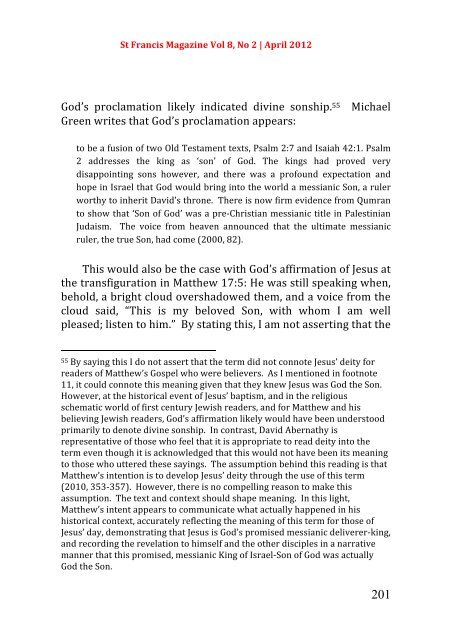Untitled - St.Francis Magazine
Untitled - St.Francis Magazine
Untitled - St.Francis Magazine
You also want an ePaper? Increase the reach of your titles
YUMPU automatically turns print PDFs into web optimized ePapers that Google loves.
<strong>St</strong> <strong>Francis</strong> <strong>Magazine</strong> Vol 8, No 2 | April 2012 God’s proclamation likely indicated divine sonship. 55 Michael Green writes that God’s proclamation appears: to be a fusion of two Old Testament texts, Psalm 2:7 and Isaiah 42:1. Psalm 2 addresses the king as ‘son’ of God. The kings had proved very disappointing sons however, and there was a profound expectation and hope in Israel that God would bring into the world a messianic Son, a ruler worthy to inherit David’s throne. There is now firm evidence from Qumran to show that ‘Son of God’ was a pre-‐Christian messianic title in Palestinian Judaism. The voice from heaven announced that the ultimate messianic ruler, the true Son, had come (2000, 82). This would also be the case with God’s affirmation of Jesus at the transfiguration in Matthew 17:5: He was still speaking when, behold, a bright cloud overshadowed them, and a voice from the cloud said, “This is my beloved Son, with whom I am well pleased; listen to him.” By stating this, I am not asserting that the 55 By saying this I do not assert that the term did not connote Jesus’ deity for readers of Matthew’s Gospel who were believers. As I mentioned in footnote 11, it could connote this meaning given that they knew Jesus was God the Son. However, at the historical event of Jesus’ baptism, and in the religious schematic world of first century Jewish readers, and for Matthew and his believing Jewish readers, God’s affirmation likely would have been understood primarily to denote divine sonship. In contrast, David Abernathy is representative of those who feel that it is appropriate to read deity into the term even though it is acknowledged that this would not have been its meaning to those who uttered these sayings. The assumption behind this reading is that Matthew’s intention is to develop Jesus’ deity through the use of this term (2010, 353-‐357). However, there is no compelling reason to make this assumption. The text and context should shape meaning. In this light, Matthew’s intent appears to communicate what actually happened in his historical context, accurately reflecting the meaning of this term for those of Jesus’ day, demonstrating that Jesus is God’s promised messianic deliverer-‐king, and recording the revelation to himself and the other disciples in a narrative manner that this promised, messianic King of Israel-‐Son of God was actually God the Son. 201







![Reflections on Surah Fatiha and the Lord's Prayer[1] - St.Francis ...](https://img.yumpu.com/49377951/1/184x260/reflections-on-surah-fatiha-and-the-lords-prayer1-stfrancis-.jpg?quality=85)








